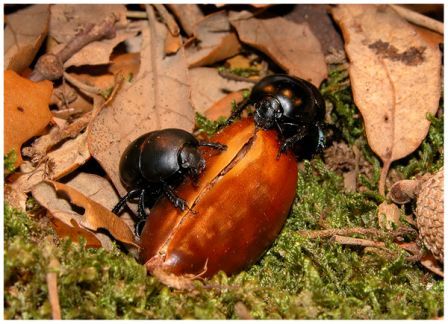Worth a Thousand Words
Who is not familiar with the image of a dung beetle, rolling a piece of elephant feces bigger than itself, providing food and shelter for its young? But it is unlikely you have seen this instead – a dung beetle rolling and eating an acorn:
Yet, that is exactly what dung beetles do. But they don’t do it all the time, they eat acorns only in autumn. The question is why?
In last week’s PLoS ONE article Dung Beetles Eat Acorns to Increase Their Ovarian Development and Thermal Tolerance by José R. Verdú, José L. Casas, Jorge M. Lobo and Catherine Numa asked that question in the lab. They divided some dung beetles into two groups and gave acorns as food to only one of the groups.
And what did they find? The individuals fed acorns built much larger fat stores in the fat body which is the source of metabolites used by the insect for a varieties of functions – from cold resistance to formation of egg yolk.
Furthermore, acorn diet resulted in much larger, better developed ovaries which, presumably, would allow the individual to lay more eggs and thus enhance its reproductive advantage over the beetles that did not eat acorns. From the Abstract:
Animals eat different foods in proportions that yield a more favorable balance of nutrients. Despite known examples of these behaviors across different taxa, their ecological and physiological benefits remain unclear. We identified a surprising dietary shift that confers ecophysiological advantages in a dung beetle species. Thorectes lusitanicus, a Mediterranean ecosystem species adapted to eat semi-dry and dry dung (dung-fiber consumers) is also actively attracted to oak acorns, consuming and burying them. Acorn consumption appears to confer potential advantages over beetles that do not eat acorns: acorn-fed beetles showed important improvements in the fat body mass, hemolymph composition, and ovary development. During the reproductive period (October-December) beetles incorporating acorns into their diets should have greatly improved resistance to low-temperature conditions and improved ovarian development. In addition to enhancing the understanding of the relevance of dietary plasticity to the evolutionary biology of dung beetles, these results open the way to a more general understanding of the ecophysiological implications of differential dietary selection on the ecology and biogeography of these insects.

